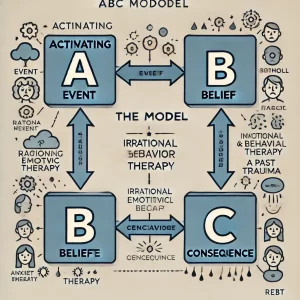Imagine a world where we were all taught practical tools to manage our thoughts and emotions from a young age. I believe that if we learned to challenge our irrational beliefs in school, anxiety and depression rates would plummet. We would understand the weight of our beliefs and how they influence everything we do, sometimes in ways that hold us back, often in ways we don’t even realize.
This is where Rational Emotive Behavior Therapy (REBT) comes in. It’s a framework I use extensively in my coaching practice, helping clients uncover, challenge, and ultimately transform the beliefs that put shadows over their actions and potential. Beliefs shape our reality, yet most of us operate on autopilot, treating these beliefs as the ultimate truth. But what if they aren’t? What if the beliefs you’ve built your life around are not as rational as you think?
How our beliefs are shaped
Beliefs are formed over time, influenced by our experiences, culture, upbringing, and environment. From childhood, we absorb messages from the people around us—parents, teachers, peers—and from the world at large—social media, TV, etc. These messages accumulate to shape our belief system, the internal dialogue we carry with us. However, many of these beliefs are irrational or outdated, reflecting fears or assumptions that don’t serve us anymore.
For example, let’s say you’ve grown up believing that failure means you’re not good enough. This belief might have been shaped by early experiences where success was praised and failure was frowned upon. Now, as an adult, this irrational belief could make you avoid risks, resist challenges, or even suffer from perfectionism. The result? You stay stuck, fearing anything that threatens your sense of worth. The truth is that the beliefs are there as it’s your brain’s creation, as a coping mechanism, to keep you where it beliefs, you are safe. In your comfort zone. Why? Because your brain’s primary goal is to keep you alive, so to keep as much energy as possible, for the potential future threat. So when is senses something uncomfortable, your brain knows, it will have to use some energy. So instead of happily doing it, it will create a mechanism for saving this energy.
But here’s the thing: this belief is not based on objective reality. It’s a perception shaped by your past, not a reflection of your current abilities or potential. And this is exactly where REBT steps in.
Working with beliefs in coaching
When clients come to me, they usually aren’t aware of how their beliefs shape their lives. What they do know is the consequence, whether it’s emotional, behavioral, or cognitive, that’s causing them distress. These consequences might manifest as anxiety, procrastination, frustration, or any other emotional or behavioral response. Often, people tell themselves stories to justify how they’re feeling, which keeps them stuck.
In Rational Emotive Behavior Therapy (REBT), we look at the ABC model to break this cycle. Clients present the consequence (C), but we work backward to find the root of the issue.
- A stands for Activation: the event that triggered the feeling or behavior. This could be something recent or a recurring event linked to past experiences. For instance, a work presentation might trigger anxiety, but the base event could be an earlier experience of being criticized in school.
- B is the Belief tied to that activation. Our beliefs about situations are often shaped by past experiences and tend to be irrational. We carry these beliefs forward without questioning them, and they become ingrained in our thinking. This creates automatic, often harmful, reactions. For example, after being criticized at school, a client might form the irrational belief that they’re not good enough, which continues to affect them in adult life.
Once we’ve identified the belief, we move to the disputing phase (D). This is where we challenge the belief. I ask the client, “Is this belief really true? What evidence do you have for or aga
inst it?” This is where they often discover that the belief isn’t grounded in fact but in perception or fear. We work to reframe the belief into something more rational and empowering, replacing it with something that supports their growth and well-being.
Finally, the Effect (E) is the emotional and behavioral shift that happens when the belief is changed. Clients experience relief, clarity, and most importantly, a sense of control over their emotions and actions.

Why we should all be using REBT
REBT is not just something to be used in therapy or coaching. It’s a life skill, a practical tool we can all benefit from using daily. Think about how much of our stress, anxiety, and even depression comes from beliefs that simply aren’t true. How often do we beat ourselves up, compare ourselves to others, or feel trapped by circumstances?
One of the biggest issues is that we don’t question our beliefs enough. We live by them as if they’re written in stone, not realizing that we have the power to challenge and change them. If we all understood how to do this from an early age, we’d have far more resilient minds. Imagine a world where we could look at a stressful event, recognize the irrational beliefs behind our emotions, and then pivot into a more rational way of thinking. We would navigate life with far more ease and confidence, knowing we have the power to shape our emotional responses rather than being controlled by them.
Real results: what clients experience
The results of using REBT are profound. Clients often come to me feeling trapped by their circumstances, whether it’s a career rut, relationship issues, or self-doubt. Through REBT, they start to realize that their limitations are often self-imposed, rooted in beliefs that don’t reflect who they are or what they’re capable of today.
For example, I had a client who believed they weren’t cut out for leadership because of past mistakes. Through REBT, we worked on challenging the belief that failure defined them. They began to see those past experiences as learning opportunities rather than proof of inadequacy. The result? They gained the confidence to step into a leadership role, transforming not just their career but their entire outlook on life.
Why REBT matters
This is why I’m so passionate about REBT. It gives people the tools to challenge their own thinking and take back control of their emotional world. In a time where mental health challenges are on the rise, I believe REBT could be a game-changer if more people had access to it. If we could teach this in schools, we would empower future generations to approach life with a rational, empowered mindset.
I’ve been working with REBT, and it’s transformed not only my clients’ lives but my own too. One of the most personal breakthroughs for me was realizing I could be my own role model. For years, I looked to others to define what success looked like. I constantly compared myself to other coaches or professionals, feeling like I wasn’t enough. But through REBT, I learned to challenge those beliefs and embrace my own path.
Now, I don’t just teach this to clients, I live it myself.
In the end, REBT is about freedom. Freedom from the beliefs that weigh us down, the irrational thoughts that make us feel stuck, and the emotional patterns that keep us from living fully. When you start to work with your beliefs, you’ll realize that you have far more power over your reality than you ever imagined. And that, to me, is the ultimate transformation.
